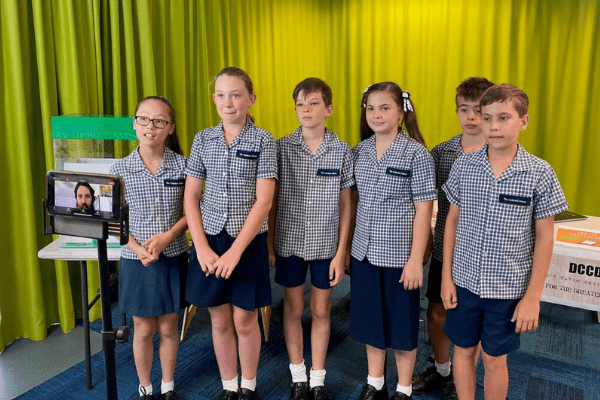Young ICT Explorers is a non-profit competition, that encourages school students to create their best Information & Communication Technology (ICT) related projects. This year, with the event being held virtually – The Cathedral School competed with three Year 6, and three Year 5 students. Each team had ten minutes to pitch their inventions and answer a range of questions, to a panel of judges across Australia.
 The competition’s alignment with the school curriculum enables students to apply what they learn in their ICT/Digital Technologies classroom to develop a technology related project of their choice. At the judging event, students have the opportunity to present their project to a judging panel of academia, industry partners and ICT professionals. Each project is assessed on the criteria of creativity, uniqueness, quality, level of difficulty and project documentation. Young ICT Explorers.
The competition’s alignment with the school curriculum enables students to apply what they learn in their ICT/Digital Technologies classroom to develop a technology related project of their choice. At the judging event, students have the opportunity to present their project to a judging panel of academia, industry partners and ICT professionals. Each project is assessed on the criteria of creativity, uniqueness, quality, level of difficulty and project documentation. Young ICT Explorers.
Junior School YICTE Organiser, Mr Ben Dallimore has seen some incredible ideas and inventions develop during his involvement in the past seven years of competition. “Each year I am amazed by the creative ideas of our students, and the way in which YICTE is structured allows our students to explore areas of interest and create amazing projects which they are passionate about.”
With an open brief, the theme gravitated around topics which concerned and inspired the students the most; the environment, and Covid-19. Summer Mason & Isabelle Pond (Year 6), created the ECO or, Environment Compost Organiser – which automated the composting process. “Their project saw them create a prototype of an automated compost machine which – once the grass clippings and food scraps are added – times the transformation to usable compost. With a tumbling central unit and lights indicating progress, the ECO simplifies composting so that everyone can do it. The girls have plans to install actual units within schools and homes, to help reduce everyone’s carbon footprint,” said Mr Dallimore.
Year 6 student Heidi Zahn developed the DCCD, or ‘Don’t Catch Covid Device’. With social distancing becoming important strategy against Covid-19, this wearable device helps to manage the task. The DCCD monitors proximity to others and alerts the user with a small led light when a person enters the 1.5 meter radius of the wearer.
Year 5 students Thomas Acton, Zeb Whelan and William McCallum presented the Automated Sensored Water System. With a series of sensors, the system can detect moisture levels in the garden, and activate a sprinkler system when the garden needs it. The sprinkler automatically stops when the soil reached its optimum moisture level, providing efficient and measurable water usage.
Mr Dallimore was clearly impressed with both the inventions and the way the students presented to the judges. “I was incredibly proud of the student’s presentations to the judges over ZOOM. They clearly articulated their ideas and provided thoughtful responses to the judge’s questions”.

The competition’s alignment with the school curriculum enables students to apply what they learn in their ICT/Digital Technologies classroom to develop a technology-related project of their choice. At the judging event, students have the opportunity to present their project to a judging panel of academia, industry partners and ICT professionals. Each project is assessed on the criteria of creativity, uniqueness, quality, level of difficulty and project documentation. Young ICT Explorers.
Junior School YICTE Organiser, Mr Ben Dallimore has seen some incredible ideas and inventions develop during his involvement in the past seven years of competition. “Each year I am amazed by the creative ideas of our students, and the way in which YICTE is structured allows our students to explore areas of interest and create amazing projects which they are passionate about.”
With an open brief, the theme gravitated around topics which concerned and inspired the students the most; the environment, and Covid-19. Summer Mason & Isabelle Pond (Year 6), created the ECO or, Environment Compost Organiser – which automated the composting process. “Their project saw them create a prototype of an automated compost machine which – once the grass clippings and food scraps are added – times the transformation to usable compost. With a tumbling central unit and lights indicating progress, the ECO simplifies composting so that everyone can do it. The girls have plans to install actual units within schools and homes, to help reduce everyone’s carbon footprint,” said Mr Dallimore.
Year 6 student Heidi Zahn developed the DCCD, or ‘Don’t Catch Covid Device’. With social distancing becoming important strategy against Covid-19, this wearable device helps to manage the task. The DCCD monitors proximity to others and alerts the user with a small led light when a person enters the 1.5 meter radius of the wearer.
Year 5 students Thomas Acton, Zeb Whelan and William McCallum presented the Automated Sensored Water System. With a series of sensors, the system can detect moisture levels in the garden, and activate a sprinkler system when the garden needs it. The sprinkler automatically stops when the soil reached its optimum moisture level, providing efficient and measurable water usage.
Mr Dallimore was clearly impressed with both the inventions and the way the students presented to the judges. “I was incredibly proud of the student’s presentations to the judges over ZOOM. They clearly articulated their ideas and provided thoughtful responses to the judge’s questions”.
